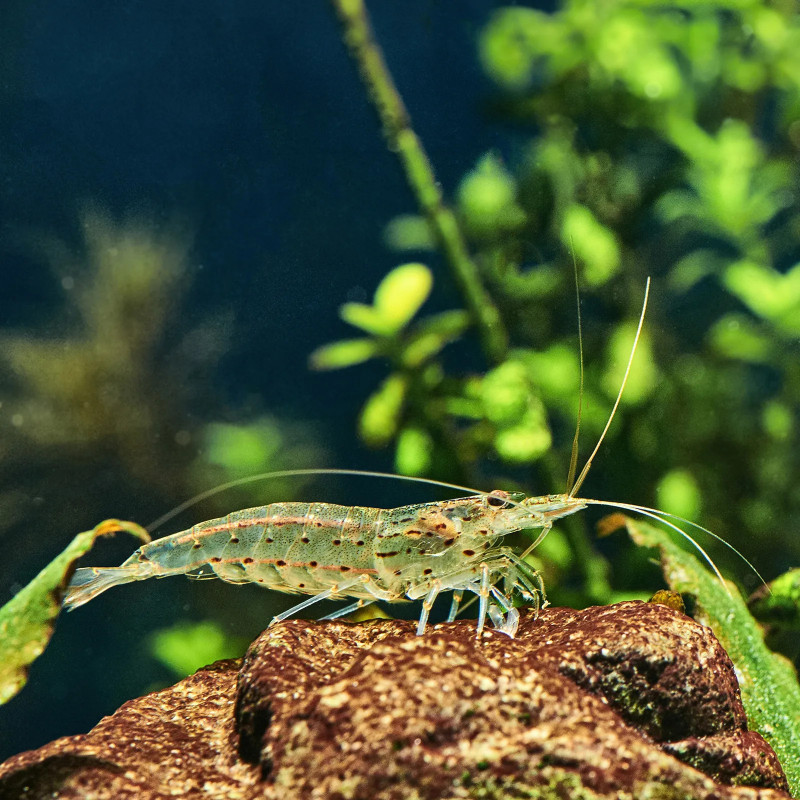Stocks Available
Gold Back Yellow Fire Shrimp
SKU:118225
NEOCARIDINA SP.
0.5-1 INCH

Out of stock
Introduction: Species: Caridina multidentata Common Names: Amano Shrimp, Japonica Shrimp Natural Habitat: Native to freshwater rivers and streams in Japan, the Amano Shrimp is typically found in clean, well-oxygenated waters with abundant vegetation and driftwood. Physical Characteristics: Appearance: The Amano Shrimp features a translucent body with a unique pattern of light and dark stripes that can vary among individuals. They have a distinctive rostrum and long antennae. Their coloration may range from clear to a light brown or greenish hue, often appearing more vibrant when kept in well-maintained tanks. Size: Grows to about 2-3 inches (5-7.5 cm) in length. Lifespan: Typically lives for 2-3 years with proper care. Habitat Requirements: Tank Size: A minimum of 10 gallons is recommended for a small group; larger tanks are preferable to maintain stable water conditions. Water Conditions: Temperature: 70-80°F (21-27°C). pH: 6.0-7.5 (slightly acidic to neutral). Hardness: Soft to moderately hard water (4-8 dGH). Aquascaping: Create a well-planted aquarium with plenty of hiding spots using mosses, rocks, and driftwood. Providing open areas for swimming is also essential, as Amano Shrimp are active foragers. Diet: Primary Diet: Omnivorous; in their natural habitat, they consume biofilm, algae, and decaying plant matter. Supplemental Feeding: In captivity, offer high-quality shrimp pellets, algae wafers, blanched vegetables (such as zucchini and spinach), and occasional protein sources like spirulina powder. They are particularly effective at controlling algae growth in the aquarium. Feeding Frequency: Feed small amounts daily, ensuring any uneaten food is promptly removed to maintain water quality. Compatibility: Temperament: Generally peaceful and social; Amano Shrimp do best in groups of 5 or more to exhibit natural behavior. Suitable Tank Mates: Compatible with a variety of small, peaceful fish like Neon Tetras, Rasboras, and other community fish. They can also coexist with other shrimp species, provided that tank mates are not aggressive. Incompatibilities: Avoid housing them with larger or aggressive fish that may prey on the shrimp, as well as fin-nipping species. Care Level: Difficulty: Moderate; while they are generally resilient, Amano Shrimp require stable water parameters and good tank maintenance to thrive. Health Monitoring: Regularly check for signs of molting, and ensure access to calcium-rich food sources to promote healthy shell development. Monitor water quality closely, as fluctuations can lead to stress and health issues. Breeding: Breeding in Captivity: Breeding can be challenging in home aquariums due to the specific conditions required for larval development. Spawning: Females carry fertilized eggs under their tails, and the larvae require brackish water to develop into juvenile shrimp. This makes breeding in captivity less common, as the larvae need specific conditions not typically found in freshwater tanks. Economic Considerations: Market Demand: There is a steady demand for Amano Shrimp among aquarists due to their effectiveness in controlling algae and their appealing appearance. Wholesale/Retail Pricing: Prices can vary, but they are generally affordable compared to other specialty shrimp. Sustainability and Conservation: Wild Population: While not currently considered endangered, habitat degradation can impact natural populations. Aquaculture Efforts: Increasingly bred in captivity to reduce reliance on wild populations and promote sustainable practices. Regulations: Follow local regulations regarding the trade of freshwater shrimp, as some regions may have restrictions on certain species. Conclusion: The Japonica Amano Shrimp is a popular and beneficial addition to freshwater aquariums. Their unique appearance and peaceful nature, combined with their ability to help control algae, make them a favorite among aquarists. With moderate care requirements and a focus on stable water conditions, Amano Shrimp are suitable for both novice and experienced aquarists. With proper attention to their habitat and diet, these shrimp can thrive and enhance the beauty and health of your aquarium.
Data sheet
16 other products in the same category:
Customers who bought this product also bought: